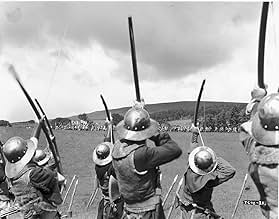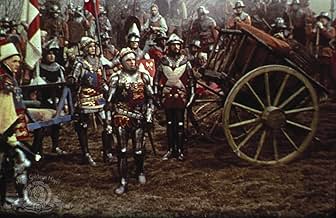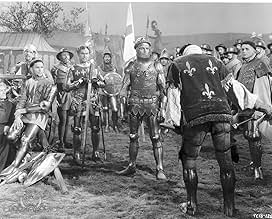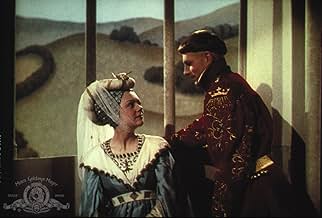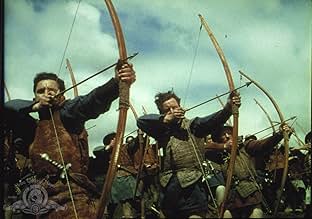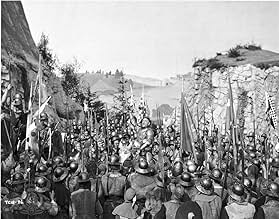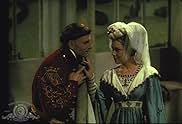The Chronicle History of King Henry the Fifth with His Battell Fought at Agincourt in France
IMDb रेटिंग
7.0/10
7.4 हज़ार
आपकी रेटिंग
अपनी भाषा में प्लॉट जोड़ेंIn the midst of the Hundred Years' War, the young King Henry V of England embarks on the conquest of France in 1415.In the midst of the Hundred Years' War, the young King Henry V of England embarks on the conquest of France in 1415.In the midst of the Hundred Years' War, the young King Henry V of England embarks on the conquest of France in 1415.
- 4 ऑस्कर के लिए नामांकित
- 12 जीत और कुल 6 नामांकन
फ़ीचर्ड समीक्षाएं
What an intelligent film!!! I loved its stage-y quality--The good-humored recreation of a performance in Shakespeare's time with the audience so fully engaged, laughing at jokes we don't understand (e.g., the machinations of churchmen). I loved the details and sense of history--the sets inspired by medieval illuminations and the score by William Walton. The tight script and directing bring out the complexity of the play. Unlike other reviewers, I'd rate it higher than Branagh's more visceral, contemporary version though I can see why some might find this one pallid. It doesn't have a modern feel, and this style of acting Shakespeare feels dated to me--I've grown accustomed to naturalism. Overall, I appreciate that it is many-layered and distinctively English. I hope it accomplished its worthy goal of raising morale during the WWII.
Olivier was asked by his government to make this film during the second world war to raise the morale of civilians and troops alike. He abstained from showing excessive blood and gore, used the language of Shakespeare brilliantly and achieved his mission. I have seen this film many times and it never fails to thrill me. The story line is commonly known, we know how happily it came out in the end. It was the first Shakespearian play made on film in color and enthralled all who saw it.
"Henry V" is poetry within the historical context of English patriotic pageantry. At the beginning, we are asked to imagine "a kingdom for a stage, princes to act and monarchs to behold the swelling scene." Directed by Laurence Olivier, the film begins in the enclosed intimacy of a studio-created Globe Theatre, performed before an appropriately attired Elizabethan audience. However, Olivier then uses the medium of Cinema to physically "open up" the play as it progresses from scene to scene, increasingly taking advantage of more and more elaborate studio scenery and lighting and mattes, ultimately using vast exterior locations for the climactic Battle of Agincourt.
Olivier, in the lead role, is a forceful King Harry, but his work and imagination behind the camera are stunning, especially for a first-time director. The humor of the fumbling "unraised spirits" who impersonate the roles of the Archbishop of Canterbury (Felix Aylmer) and the Bishop of Ely (Robert Helpmann) is an early surprise, as is the coarse high-jinks of Robert Newton's interpretation of Pistol, chewing up the scenery and everything in sight.
As a director, Olivier transforms the conventions of the stage. He shows us a fleet of miniature warships engulfed in an English Channel fog, a Chorus (Leslie Banks) superimposed against painted, moving backdrops, and, toward the end, the bleak French post-battle countryside - a zone of pillage, poverty, and heartbreak in the aftermath of battle.
This version of "Henry V" was made with a wartime audience in mind. (The 'V' in the title is a perfect symbolic reference for the times.) Here, the overconfident Dauphin (Max Adrian) and other French nobles stand in for authoritarianism; and the common men who make up the motley army of British archers and infantry represent their enemy -- and ultimately the victors.
Olivier, in the lead role, is a forceful King Harry, but his work and imagination behind the camera are stunning, especially for a first-time director. The humor of the fumbling "unraised spirits" who impersonate the roles of the Archbishop of Canterbury (Felix Aylmer) and the Bishop of Ely (Robert Helpmann) is an early surprise, as is the coarse high-jinks of Robert Newton's interpretation of Pistol, chewing up the scenery and everything in sight.
As a director, Olivier transforms the conventions of the stage. He shows us a fleet of miniature warships engulfed in an English Channel fog, a Chorus (Leslie Banks) superimposed against painted, moving backdrops, and, toward the end, the bleak French post-battle countryside - a zone of pillage, poverty, and heartbreak in the aftermath of battle.
This version of "Henry V" was made with a wartime audience in mind. (The 'V' in the title is a perfect symbolic reference for the times.) Here, the overconfident Dauphin (Max Adrian) and other French nobles stand in for authoritarianism; and the common men who make up the motley army of British archers and infantry represent their enemy -- and ultimately the victors.
This is seriously fantastic stuff. As many others will know by now, I am a huge fan of Laurence Olivier's work, but this inspirational and revelatory performance surpasses all. The first and most important thing is the timing. Incredible!! Olivier managed to get the whole thing together in time for D-Day! (sorry, that was not quite relevant) The fact is, his portrayal of King Henry V had a deliberate purpose to it... he wanted to give England courage in the war they were fighting, just as King Harry had courage against the french.
Everything, the sets, the colours, all are so majestic and wonderfully theatrical. That's because Olivier did not want to keep his audience on the indifferent grounds of reality. For many in 1944, winning the war was something totally out of reality, just as it was so for the English at the battle of Agincourt. Olivier wished to transport his audience to the god-given victory, and transport them he did. "Once more unto the breach!" Even as a little fourteen-year-old viewer of Sir Laurence speaking these famous words this gave me the curious inspiration... the same that it gave to Winston Churchill sixty years ago. For me, I don't know what the inspiration was for. For Churchill, it was claiming victory in world war 2.
Whatever your taste, background, or personality; this film is inspirational, and recommended viewing for everyone. You would be missing something terrible if you did not see this pure patron of an actor grace the screen majestically with his regal inspiration.
Everything, the sets, the colours, all are so majestic and wonderfully theatrical. That's because Olivier did not want to keep his audience on the indifferent grounds of reality. For many in 1944, winning the war was something totally out of reality, just as it was so for the English at the battle of Agincourt. Olivier wished to transport his audience to the god-given victory, and transport them he did. "Once more unto the breach!" Even as a little fourteen-year-old viewer of Sir Laurence speaking these famous words this gave me the curious inspiration... the same that it gave to Winston Churchill sixty years ago. For me, I don't know what the inspiration was for. For Churchill, it was claiming victory in world war 2.
Whatever your taste, background, or personality; this film is inspirational, and recommended viewing for everyone. You would be missing something terrible if you did not see this pure patron of an actor grace the screen majestically with his regal inspiration.
With tensions between England and the arrogant French pushed to breaking point, King Henry the Fifth sets out with his armies to conquer and quell the French in their native land. The film builds up with to the historic battle of Agincourt with the troops and the king camping together and making progress across the land.
Whenever Henry V (to use the shorten title) comes on TV I always tape it simply because I always assume that it is a masterpiece of English cinema such is it's reputation in many circles. However this reputation may not be that well deserved as I have decided from my viewing of it today. The plot is Shakespeare and I will not criticise it, but I know myself that it is not a story that I would pick if asked to chose from his canon of work I prefer the darker stuff or the out and out comedies. That aside the film tells a straightforward tale, here used to raise morale and fly the flag of Britain and England during WWII. As such it works but I needed it to be more than just a flag waving exercise, I wanted more detail and more thought. Such scenes exist within the play but Olivier does not use them as well as he uses the grandstanding speeches and battle scene his focus is not on thought but on scale.
As director he does quite well in early stages and in the actual battle itself. The device of opening ad closing in the playhouse works to good effect and is clever but far too many scenes have poor camera angles or are poorly framed. The battle scene is good but too much of the film is ordinary in terms of looks and style. As actor Olivier carries the King well but is too one dimensional for me and I didn't have to put any thought into him to watch the film. He holds back for much of the film but leaps up for more upbeat scenes or rousing speeches. The support cast all sound natural with the dialogue although some of the roles are a little bit hammy, they still hold the film together well.
Overall this is an enjoyable film that has good spectacle to it and key scenes are very good. However the lack of anything under the surface is a problem and it is one of the lesser Shakespearean adaptations I have seen. Still worth a look but if you're like me, you'll be left wondering `was that it?'
Whenever Henry V (to use the shorten title) comes on TV I always tape it simply because I always assume that it is a masterpiece of English cinema such is it's reputation in many circles. However this reputation may not be that well deserved as I have decided from my viewing of it today. The plot is Shakespeare and I will not criticise it, but I know myself that it is not a story that I would pick if asked to chose from his canon of work I prefer the darker stuff or the out and out comedies. That aside the film tells a straightforward tale, here used to raise morale and fly the flag of Britain and England during WWII. As such it works but I needed it to be more than just a flag waving exercise, I wanted more detail and more thought. Such scenes exist within the play but Olivier does not use them as well as he uses the grandstanding speeches and battle scene his focus is not on thought but on scale.
As director he does quite well in early stages and in the actual battle itself. The device of opening ad closing in the playhouse works to good effect and is clever but far too many scenes have poor camera angles or are poorly framed. The battle scene is good but too much of the film is ordinary in terms of looks and style. As actor Olivier carries the King well but is too one dimensional for me and I didn't have to put any thought into him to watch the film. He holds back for much of the film but leaps up for more upbeat scenes or rousing speeches. The support cast all sound natural with the dialogue although some of the roles are a little bit hammy, they still hold the film together well.
Overall this is an enjoyable film that has good spectacle to it and key scenes are very good. However the lack of anything under the surface is a problem and it is one of the lesser Shakespearean adaptations I have seen. Still worth a look but if you're like me, you'll be left wondering `was that it?'
क्या आपको पता है
- ट्रिवियाThe opening model shot of London was huge, 50 feet by 70 feet in size, and made of plaster. It took four months to construct.
- गूफ़Henry V's reign was in the early 1400s, but most of the costuming in the film is from 1600, the time of the plays writing, almost 200 years later. The armor on the other hand is accurate. In fact, there is no anachronism in the costumes. The story is told from two points of view (one in the 1600s, as a performance in the Globe Theater; the other in the 1400s, as the characters originally lived). Costumes shift on purpose according to the point of view.
- भाव
King Henry V of England: Tell the Dauphin his jest will savor but of shallow wit, when thousands weep more than did laugh at it.
- क्रेज़ी क्रेडिटThe main title not only gives the full title of the play as William Shakespeare wrote it, but spells the words in the 16th-century manner, not in modern spelling.
- इसके अलावा अन्य वर्जनIn the American release of the film, all references to "bastards" in the dialogue were excised.
- कनेक्शनEdited into Master of the World (1961)
- साउंडट्रैकAgincourt Hymn (Deo gracias Anglia)
(uncredited)
Latin hymn text set to anonymous tune (1415)
Arranged by William Walton
टॉप पसंद
रेटिंग देने के लिए साइन-इन करें और वैयक्तिकृत सुझावों के लिए वॉचलिस्ट करें
- How long is Henry V?Alexa द्वारा संचालित
विवरण
बॉक्स ऑफ़िस
- बजट
- £4,75,000(अनुमानित)
- दुनिया भर में सकल
- $62,619
- चलने की अवधि2 घंटे 17 मिनट
- ध्वनि मिश्रण
- पक्ष अनुपात
- 1.37 : 1
इस पेज में योगदान दें
किसी बदलाव का सुझाव दें या अनुपलब्ध कॉन्टेंट जोड़ें

टॉप गैप
By what name was The Chronicle History of King Henry the Fifth with His Battell Fought at Agincourt in France (1944) officially released in India in English?
जवाब


